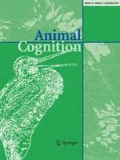Abstract
Studies of contagious yawning have reported inconsistent findings regarding whether dogs exhibit this behavior and whether it is mediated by social-cognitive processes or the result of physiological arousal. We investigated why some dogs yawn in response to human yawns; particularly, whether these dogs are exceptional in their ability to understand human social cues or whether they were more physiologically aroused. Sixty shelter dogs were exposed to yawning and nonyawning control stimuli demonstrated by an unfamiliar human. We took salivary cortisol samples before and after testing to determine the role of arousal in yawn contagion. Dogs were tested on the object-choice task to assess their sensitivity for interpreting human social cues. We found that 12 dogs yawned only in response to human yawns (i.e., appeared to exhibit yawn contagion), though contagious yawning at the population level was not observed. Dogs that exhibited yawn contagion did not perform better on the object-choice task than other dogs, but their cortisol levels remained elevated after exposure to human yawning, whereas other dogs had reduced cortisol levels following yawning stimuli relative to their baseline levels. We interpret these findings as showing that human yawning, when presented in a stressful context, can further influence arousal in dogs, which then causes some to yawn. Although the precise social-cognitive mechanisms that underlie contagious yawning in dogs are still unclear, yawning between humans and dogs may involve some communicative function that is modulated by context and arousal.




Similar content being viewed by others
References
Anderson JR, Meno P (2003) Psychological influences of yawning in children. Curr Psychol Lett 11(2). (http://cpl.revues.org/index390.html)
Anías-Calderón J, Verdugo-Díaz L, Drucker-Colín R (2004) Adrenalectomy and dexamethasone replacement on yawning behavior. Beh Brain Res 154:225–259. doi:10.1016/j.bbr.2003.08.020
Arnott SR, Singhal A, Goodale MA (2009) An investigation of auditory contagious yawning. Cogn Affect Behav Neurosci 9:335–342. doi:10.3758/CABN.9.3.335
Baenninger R (1997) On yawning and its functions. Psychon Bull Rev 4:198–207
Beerda B, Schilder MH, van Hooff JM, de Vries HW, Mol JA (1998) Behavioral, saliva cortisol and heart rate responses to different types of stimuli in dogs. Appl Anim Behav Sci 58:365–381. doi:10.1016/S0168-1591(97)00145-7
Campbell MW, de Waal FBM (2010) Methodological problems in the study of contagious yawning. In: Walusinski O (ed) The mystery of yawning in physiology and disease: frontiers of neurology and neuroscience. Karger, Basel, pp 120–127
Campbell MW, de Waal FBM (2011) Ingroup-outgroup bias in contagious yawning by chimpanzees supports link to empathy. PLoS One 6:e18283. doi:10.1371/journal.pone.0018283
Demuru E, Palagi E (2012) In bonobos yawn contagion is higher among kin and friends. PLoS One 7:e49613. doi:10.1371/journal.pone.0049613
Deputte BL (1994) Ethological study of yawning in primates: I. Quantitative-analysis and study of causation in two species of old world monkeys (Cercocebus albigena and Macaca fascicularis). Ethology 98:221–245
Dreschel NA, Granger DG (2005) Physiological and behavioral reactivity to stress in thunderstorm-phobic dogs and their caregivers. Appl Anim Behav Sci 95:153–168. doi:10.1016/j.applanim.2005.04.009
Emery NJ, Clayton NS (2009) Comparative social cognition. Ann Rev Psychol 60:87–113. doi:10.1146/annurev.psych.60.110707.163526
Giganti F, Esposito Ziello M (2009) Contagious and spontaneous yawning in autistic and typically developing children. Curr Psychol Lett 25(1):1–11. Retrieved from: http://cpl.revues.org/index4810.html
Guggisberg AG, Mathis J, Schnider A, Hess CW (2010) Why do we yawn? Neurosci Biobehav Rev 34:1267–1276. doi:10.1016/j.neubiorev.2010.03.008
Hare B, Brown M, Williamson C, Tomasello M (2002) The domestication of social cognition in dogs. Science 298:1634–1636. doi:10.1126/science.1072702
Hare B, Rosati A, Kaminski J, Bräuer J, Call J, Tomasello M (2010) The domestication hypothesis for dogs’ skills with human communication: a response to Udell et al. (2008) and Wynne et al. (2008). Anim Behav 79:e1–e6. doi:10.1016/j.anbehav.2009.06.031
Harr AL, Gilbert VR, Phillips KA (2009) Do dogs (Canis familiaris) show contagious yawning? Anim Cogn 12:833–837. doi:10.1007/s10071-009-0233-0
Hennessy MB, Davis HN, Williams MT, Mellott C, Douglas CW (1997) Plasma cortisol levels of dogs at a county animal shelter. Phys Behav 6:485–490. doi:10.1016/S0031-9384(97)80328-9
Hennessy MB, Williams MT, Miller DD, Douglas CW, Voith VL (1998) Influence of male and female petters on plasma cortisol and behavior: can human interaction reduce the stress of dogs in a public animal shelter? Appl Anim Behav Sci 61:63–77. doi:10.1016/S0168-1591(98)00179-8
Joly-Mascheroni RM, Senju A, Shepherd AJ (2008) Dogs catch human yawns. Biol Lett 4:446–448. doi:10.1098/rsbl.2008.0333
Kobelt A, Hemsworth PH, Barnett JL, Butler KL (2003) Sources of sampling variation in saliva cortisol in dogs. Res Vet Sci 75:57–161
Madsen EA, Persson T (2012) Contagious yawning in domestic dog puppies (Canis lupis familiaris): the effect of ontogeny and emotional closeness on low-level imitation in dogs. Anim Cogn 16:233–240. doi:10.1007/s10071-012-0568-9
Maestripieri D, Schino G, Aureli F, Troisi A (1992) A modest proposal: displacement activities as an indicator of emotions in primates. Anim Behav 44:967–979. doi:10.1016/S0003-3472(05)80592-5
Massen JJ, Vermunt DA, Sterck EH (2012) Male yawning is more contagious than female yawning among chimpanzees (Pan troglodytes). PLoS One 7:e40697
Miklósi A, Topál J (2011) On the hunt for the gene of perspective taking: pitfalls in methodology. Learn Behav 39:310–313. doi:10.3758/s13420-011-0038-2
Millen A, Anderson JR (2011) Neither infants nor toddlers catch yawns from their mothers. Biol Lett 7:440–442. doi:10.1098/rsbl.2010.0966
Norscia I, Palagi E (2011) Yawn contagion and empathy in Homo sapiens. PLoS One 6:e28472. doi:10.1371/journal.pone.0028472
O’Hara SJ, Reeve AV (2011) A test of the yawning contagion and emotional connectedness hypothesis in dogs, Canis familiaris. Anim Behav 81:335–340. doi:10.1016/j.anbehav.2010.11.005
Palagi E, Leone A, Mancini G, Ferrari PF (2009) Contagious yawning in gelada baboons as a possible expression of empathy. Proc Natl Acad Sci USA 106:19262–19267. doi:10.1073_pnas.0910891106
Paukner A, Anderson JR (2006) Video-induced yawning in stumptail macaques (Macaca arctoides). Biol Lett 2:36–38. doi:10.1098/rsbl.2005.0411
Platek SM, Critton SR, Myers TE, Gallup GG Jr (2003) Contagious yawning: the role of self-awareness and mental state attribution. Cogn Brain Res 17:223–227. doi:10.1016/S0926-6410(03)00109-5
Provine RR (1986) Yawning as a stereotyped action pattern and releasing stimulus. Ethology 72:448–455
Reid PJ (2009) Adapting to the human world: dogs’ responsiveness to our social cues. Behav Process 80:325–333
Rooney NJ, Gaines SA, Bradshaw JS (2007) Behavioral and glucocorticoid responses of dogs (Canis familiaris) to kennelling: investigating mitigation of stress by prior habituation. Physiol Behav 92:847–854. doi:10.1016/j.physbeh.2007.06.011
Senju A, Maeda M, Kikuchi Y, Hasegawa T, Tojo Y, Osanai H (2007) Absence of contagious yawning in children with autism spectrum disorder. Biol Lett 3:706–708. doi:10.1098/rsbl.2007.0337
Senju A, Kikuchi Y, Akechi H, Hasegawa T, Tojo Y, Osanai H (2009) Brief report: does eye contact induce contagious yawning in children with autism spectrum disorder? J Autism Devel Disord 39(11):1598–1602. doi:10.1007/s10803-009-0785-5
Silva K, Bessa J, de Sousa L (2012) Auditory contagious yawning in domestic dogs (Canis familiaris): first evidence for social modulation. Anim Cogn 15:721–724. doi:10.1007/s10071-012-0473-2
Tuber DS, Hennessy MB, Sanders S, Miller JA (1996) Behavioral and glucocorticoid responses of adult domestic dogs (Canis familiaris) to companionship and social separation. J Comp Psychol 110:103–108. doi:10.1037/0735-7036.110.1.103
Udell MAR, Dorey NR, Wynne CDL (2010) What did domestication do to dogs? A new account of dogs’ sensitivity to human actions. Biol Rev 85:327–345. doi:10.1111/j.1469-185X.2009.00104.x
Vincent LC, Michell AR (1992) Comparison of cortisol concentration in saliva plasma of dogs. Res Vet Sci 53:342–345
Yoon J, Tennie C (2010) Contagious yawning: a reflection of empathy, mimicry, or contagion? Anim Behav 79:e1–e3. doi:10.1016/j.anbehav.2010.02.011
Acknowledgments
We thank Jeffrey French and Daniel Hawkins for their input on this project. We are grateful to Jefferey French for the use of the UNOmaha Endocrine BioServices Assay Laboratory and also to Andrew Birnie, Kaitlyn Filippini, and Jon Cavanaugh for their assistance in the laboratory. We also thank Denise Gurss and the Nebraska Humane Society for the use of their facility and animals, and Asia Cahill, Sydney Waldo, and Briana Licht for their help with data collection. This research was supported by the University of Nebraska at Omaha, Office of Sponsored Programs and Research, and the Rhoden Biological Fellowship.
Author information
Authors and Affiliations
Corresponding author
Rights and permissions
About this article
Cite this article
Buttner, A.P., Strasser, R. Contagious yawning, social cognition, and arousal: an investigation of the processes underlying shelter dogs’ responses to human yawns. Anim Cogn 17, 95–104 (2014). https://doi.org/10.1007/s10071-013-0641-z
Received:
Revised:
Accepted:
Published:
Issue Date:
DOI: https://doi.org/10.1007/s10071-013-0641-z




